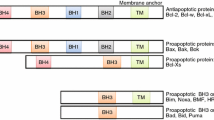Abstract.
Mitochondria have been recently recognized to play a major role in the control of apoptosis or programmed cell death. Permeabilization of mitochondrial membranes, a decisive feature of early cell death, is regulated by members of the Bcl-2 family which interact with the permeability transition pore complex (PTPC). Thus, the cytoprotective oncoprotein Bcl-2 stabilizes the mitochondrial membrane barrier function, whereas the tumor suppressor protein Bax permeabilizes mitochondrial membranes. The regulation of membrane permeabilization is intertwined with that of the bioenergetic and redox functions of mitochondria. The implications of alterations in the composition of the PTPC and in mitochondrial function for the pathophysiology of cancer (reduced apoptosis) and neurodegeneration (enhanced apoptosis) are discussed.
Similar content being viewed by others
Author information
Authors and Affiliations
Additional information
Received 14 July 1999; received after revision 9 September 1999; accepted 9 September 1999
Rights and permissions
About this article
Cite this article
Vieira, H., Kroemer, G. Pathophysiology of mitochondrial cell death control. CMLS, Cell. Mol. Life Sci. 56, 971–976 (1999). https://doi.org/10.1007/s000180050486
Issue Date:
DOI: https://doi.org/10.1007/s000180050486




